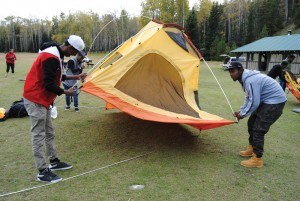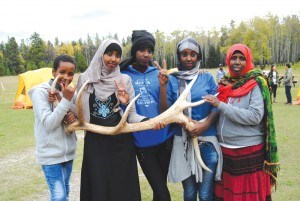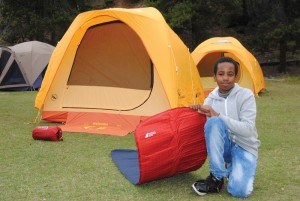
A group of 35 refugees who recently arrived in Edmonton spent last weekend camping at Whistlers Campground as part of a program designed to introduce them to camping and Canada’s national parks.
For the vast majority of the group, this was their first time camping in Canada.
“We used to camp in Syria before the war, but it was different,” said 20-year-old Mubark Ahmed, who arrived in Edmonton with his family three months ago.
“We don’t use tents, we usually just put something on the ground to sleep on,” he said in broken English.
Born in Iraq to a Somalian family, he and his family fled to Syria in 2003 when the United States invaded Iraq.
For the next 12 years he called Syria home, but when the Syrian revolution began his family had to flee once again—this time to a United Nations refugee camp.
With the help of the United Nations International Children’s Emergency Fund (UNICEF), his family was lucky enough to escape unharmed and resettled in Canada.
This is the fifth year Parks Canada and its partners have hosted a group of new comers in Jasper National Park.
The national program is called Learn To Camp and was originally designed to boost visitation and connect urban Canadians with nature, but in many ways its become more than that.

“About five years ago there was a bit of concern in a lot of our national parks and historic sites that visitation was declining and lots of urban Canadians were losing touch with nature and national parks,” said Kevin Gedling, a partnering engagement officer for Parks.
“They found through a lot of different surveys one of the things that stopped people from camping was misplaced fears and a lack of awareness and understanding.”
To change those misperceptions, Parks partnered with Mountain Equipment Co-op to create new camping opportunities specifically targeting new Canadians living in urban areas.
Prior to the group’s arrival in Jasper, Gedling spent a few days in Edmonton meeting the group and going over some basic skills, including how to set up a tent, how a sleeping bag works and information about wildlife safety.
“If you work for Parks this is the kind of work that you hope you get to do,” said Gedling.
Other partners that have come onboard in recent years include Catholic Social Services in Edmonton, the Friends of Jasper National Park, Alberta Parks and Scouts Canada.
“Beyond teaching newcomers how to camp, we’re allowing these people who are low income refugees to leave the city to experience the beautiful mountains, to come to the jewel of the Canadian Rockies,” said Frank Bessai, a settlement orientation coordinator for Edmonton’s Catholic Social Services.
“With a lot of refugee families, 80 per cent of the people suffer from PTSD and so what we have discovered is that connecting to nature and participating in outdoor recreation activities is a special kind of group therapy that puts newcomers on the right foot in terms of their integration process in Canada.”
While this group of refugees enjoyed a weekend away, tens of thousands of other refugees haven’t been so lucky.

In recent weeks the world has been shocked by the human tragedy unfolding in Europe and the Middle East.
The issue has galvanized public opinion and made it a major election issue.
After coming under pressure, the federal government recently announced it would speed up the processing time for refugee applications to allow thousands of Syrians and Iraqis into Canada by the end of the year.
The government also promised to resettle 10,000 Syrian refugees by September 2016—fifteen months earlier then it had originally planned.
Despite the government’s promise, Bessai said opening Canada’s borders to refugees is just the first step.
“Sure we can open our doors to floods of people just like that, but what are we going to do for them once they get here?
“There is no point in bringing people to Canada if they are not going to succeed here or if they’re going to live in misery.”
Bessai said some of the refugees who have arrived in Edmonton in recent years have failed and are living on the street, and he’s worried the same thing could happen to more refugees if there aren’t enough resources to go around.
“In our work we are continually forced to do a lot with very few resources and so we want the powers that be to understand how important it is to lead these people by the hand into welcoming environments, be it at school, be it in the community or be it here in Jasper National Park.”
Paul Clarke
[email protected]
